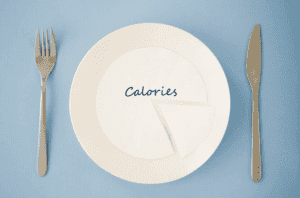
A Calorie Deficit. We’ve all heard these two words flying around in the world of weight loss and healthy living, but what do they actually mean? Today, we’re taking you back to basics to explain exactly that, and how being in a calorie deficit can result in weight loss.

What are calories?
Calories are simply a measurement of energy; they quantify the amount of energy given to your body when you consume food. For example, an exante meal replacement shake provides you with 200-230 calories.
Your body burns these calories throughout the day and you need to balance the number of calories you consume with the number of calories you burn. To lose weight, you must burn more calories than you consume by either, exercising more, eating less or a bit of both, to be in a calorie deficit.
What does it mean to be in a Calorie Deficit?
When your body is in a calorie deficit, this means that you are consuming less calories than you are burning, or in other words, using up more energy than the amount you are consuming through eating.
Your body burns calories all day every day to keep you functioning – this is referred to as ‘maintenance’ or ‘resting’ energy usage – but you can burn more with movement. For example, a brisk 30-minute walk can burn 180-220 calories.
Being in a calorie deficit is essential for weight loss because exercise alone is not always enough to reach our goals, so we must improve our diet. If you’re looking to lose weight, you need to reduce your food intake, but celery sticks and lettuce leaves won’t cut it as you will be missing out on essential vitamins, minerals, protein and fibre. It’s important that you find foods you enjoy which are high in protein and fibre, but still allow you to be in a calorie deficit – this is where the exante plans come in...
Calories consumed < Calories burned

How do the exante plans ensure you are in a calorie deficit?
The guideline daily number of calories for healthy active adults is around 2000 for females and 2500 for males, depending on weight and activity levels. On exante, calorie controlled plans mean you will be consuming less calories than you burn, therefore resulting in weight loss.
For weight loss, we recommend:
We recommend swapping 2-3 meals per day with exante meal replacements, followed by 400-600kcal healthy meals and snacks*. However, if anybody is unsure, we always recommend customers consult with a GP before embarking on a meal replacement diet.
Some customers have found consuming 800 calories or 1,200 calories to work well for them, however your daily calorie allowance is your preference. To ensure you’ll be in a calorie deficit, you can work out how many calories you need to maintain, and consume slightly less than the figure using the link here.
Here are some of our fantastic success stories:
Nicole lost 9 stone using the exante weight loss plan...

Read Nicole's story in our blog below:

Check out Karen's story in our blog:
Alex lost 10 stone during lockdown...

Check out Alex's story below
How does an exante meal replacement diet work?
Our meal replacement products contain 27 vitamins & minerals 33% NRV (Nutrient Reference Value) and are specifically designed to support you on a weight management or weight loss* journey. There’s no fear of ‘sins’ or ‘points’ with exante. We don't restrict or attach guilt to certain food groups. Instead, we understand that everybody has a different starting point, end goal, and relationship with food. Our products intend to inspire healthy habits and help you build a positive mindset towards your diet.
We encourage enjoying exante with a balanced diet. Incorporating lots of fruit, veg and protein. Plus, a healthy mixture of carbohydrates, grains and healthy fats. There are no restrictions on what you choose to make up those calories, but we encourage you to track these through food diaries or apps.
To increase flexibility even more, we have removed the ‘approved food list’, milk allowance and fruit restriction which was set a while ago. Eating these will not hinder your weight loss, ensuring you remain in a calorie deficit is the main principle of weight loss.
Now we’ve explained what a calorie deficit means, we hope you can make an informed decision as to which plan suits you – if you’re still unsure, please get in touch via our Facebook page and we’d be happy to help!
* Seek advice from a medical professional before using meal replacements if you are:
- Pregnant
- Breastfeeding
- Have any medical conditions
- Are undergoing any treatments such as cancer therapy
- Under 18 or over 71
- Are underweight
*Substituting one your daily meals with a meal replacement for the maintenance of weight after weight loss. Consume as part of a varied and balanced diet and a healthy lifestyle, maintaining an adequate daily fluid intake. We recommend following the NHS guidance of drinking 2L of water per day to stay hydrated, and lightly exercising for 30 mins per day to stay active.











